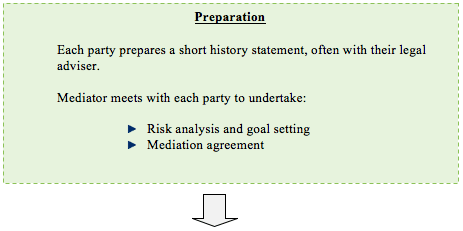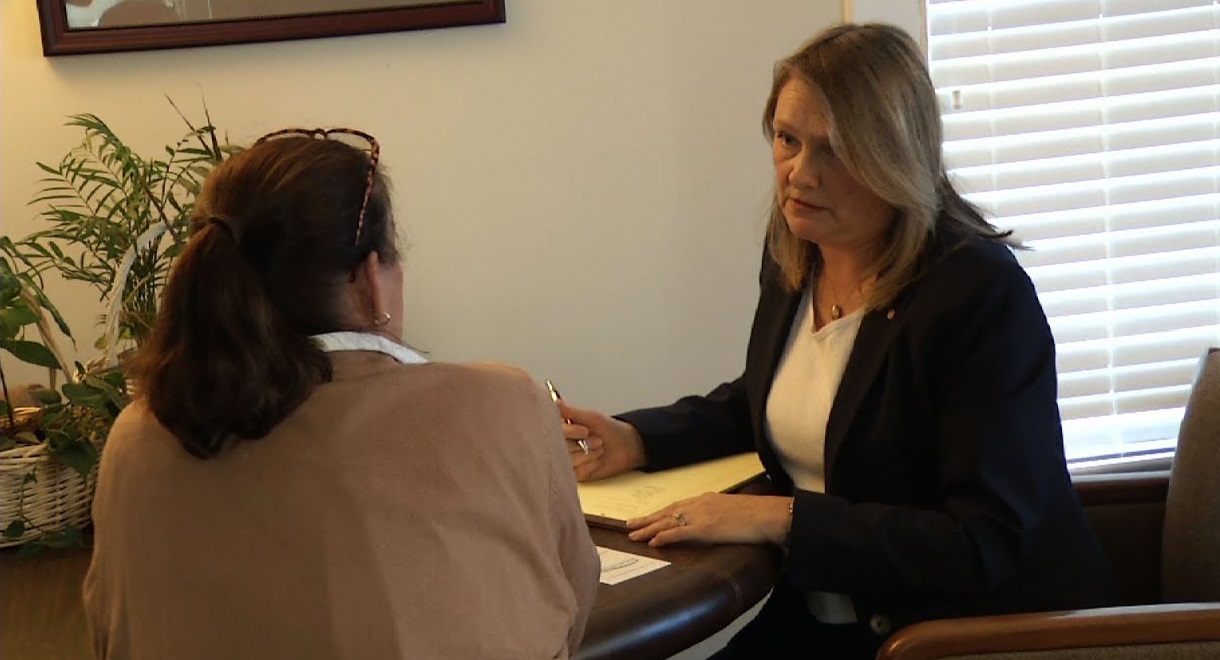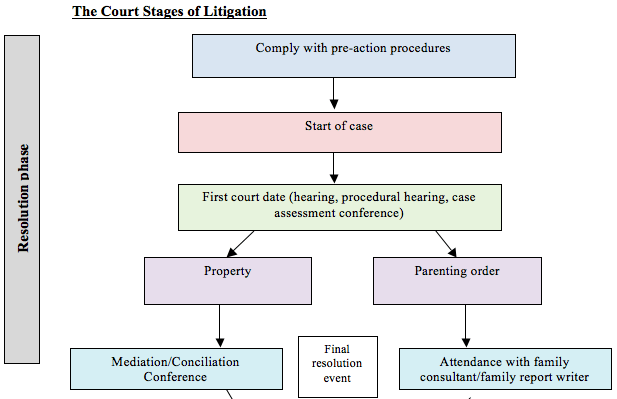Many couples separate and can agree on what they wish to happen in relation to a distribution of the asset pool (property settlement) and if there are children, the arrangements that they wish to put in place for the children’s future.
When couples are in agreement the options for formalising the property settlement and arrangements for the children are:
- Consent Orders
- Parenting Plan
- Financial Agreement
These options are discussed in more detail under the children and financial issues sections of this booklet.
WHAT HAPPENS IF COUPLES ARE UNABLE TO AGREE ON FINANCIAL AND CHILDREN’S ISSUES?
There are a number of ways to resolve diffences after a relationship has broken down.
- Counselling
- Collaborative Practice
- Mediation
- Family Law Litigation
1. Counselling
Counsellors can help you to work through problems after the breakup. You can find qualified counsellors in private practices, as well as in government and community-based organisations.
Counselling works best if you and your partner attend sessions of your own free will. However, if you and your partner go to the Family Court, you may be ordered to attend Counselling before a decision is made by the Court.
If Counselling does not prevent your relationship from breaking down it can still help with resolving emotional issues that result from the separation. It is a good idea to shop around to find a counsellor with whom you feel comfortable and confident.
2. COLLABORATIVE PRACTICE – THE NEW ALTERNATIVE TO LITIGATION
Collaborative practice is a popular dispute resolution method developed in the United States in the early 1990s. It has gained rapid popularity in the United States, the United Kingdom, and Canada. Now Collaborative practice is available to help people in Australia
Benefits of Collaborative Practice
- You have the benefit of being advised and supported by your lawyer at all times.
- The outcomes are generally faster than traditional negotiation methods and most certainly quicker than court outcomes.
- The outcomes are certain and long-lasting because they are owned by you as you assisted in creating the outcomes.
- The process promotes co-operation in the future, particularly where long-term investments are involved.
- Resolutions are reached in a dignified and respectful way.
- The outcomes are often tailor-made and more creative providing fairer settlements.
The collaborative practice may be suitable for you and your partner if both of you:
- Wish to spare your children from the emotional damage litigation can cause.
- Accept personal responsibility in moving forward and reaching an agreement.
- Believe it is important to create healthy and more holistic solutions for your future.
- Understand and embrace the necessity to make full and frank disclosure about financial issues.
The collaborative practice may not be suitable for you and your partner if either of you:
- Have a primary aim to seek revenge against your former spouse or partner.
- Are looking for a “soft option”.
- Believe the procedure will pressure your spouse or partner to agree to your wishes.
- Want to avoid giving certain financial information to your spouse or partner.
- Where your relationship has experienced domestic violence or any form of abuse. If this is the case, the lawyers will first have to determine whether Collaborative practice is appropriate. It may be that other professionals are required to be involved to assist and support you through the process and to ensure that your interests are promoted and protected.
Make your own decisions
The Collaborative approach will enable you and your partner to resolve your issues respectfully so that you can arrive at dignified solutions to your dispute with your partner and maintain a sound relationship with each other in the future, especially if long-term financial interests are involved. In the Collaborative practice process, emphasis is placed on reaching an agreement, rather than having to ‘battle it out in Court’.
Commitment to the non-confrontational dispute resolution
In the Collaborative practice, you will be asked to sign a Participation Agreement so that you demonstrate your commitment to resolving your differences with your partner in a respectful manner, with full and frank disclosure of information, and with a minimum of conflict. Open communication will build an environment of trust. This trust will help you, your partner, and both of your lawyers to work together in finding workable solutions to your dispute.
In Collaborative practice, you and your partner and your lawyers will work together to share information and to arrive at solutions through a series of meetings. Your lawyer will never negotiate deals without your active participation. A major benefit of Collaborative practice is that you and your partner can each contribute to the compromised agreements that you make together, instead of having to settle with a decision imposed upon you by the Court.
Total ‘out-of-Court’ settlement with Collaborative practic
At the commencement of the collaborative process all parties and their lawyers will enter into a Participation Agreement. Pursuant to the terms of the Participation Agreement the parties agree that they will not litigate their matter in the Family Court. This means that if either you or your partner decides to commence proceedings in Court and continue with such proceedings during the collaborative process, your collaborative lawyer will not be able to represent you in the collaborative process they will only be able to refer you to another trusted practitioner to handle your Court case.
How does it all work?
Collaborative practice is different from going to Court. You will be in a room with your lawyer as well as your partner and their lawyer. Both lawyers will be properly trained in the collaborative approach. We all work together towards the common goal of resolving the dispute between you and your partner, with emphasis on retaining your dignity and best interests.
You will have your collaborative lawyer advising and assisting you throughout the negotiations. The playing field will be more even between you and your partner, because you and your partner will have your respective lawyers to support you, as well as other professionals if necessary and with your consent.
The integrated approach of Collaborative practice
Collaborative lawyers often work with other professionals, such as accountants, financial planners, valuers, counsellors and mental health professionals, who are trained in the collaborative approach. These people will work together with your collaborative lawyers with your consent with a focus on developing an overall dispute resolution package that will provide both you and your partner with security and direction.
Note: In Collaborative practice, your lawyer and your partner’s lawyer will draft your agreement in legal terms.
3. MEDIATION
Overview of Mediation
Mediation is a voluntary process, but the Family Court may order that you and your partner participate in mediation, depending on your circumstances. Only you, your partner and the Mediator will be part of the Mediation process. Depending on the level of conflict and personal dynamics of the relationship between you and your partner two Mediators may be necessary.
Role of the MediatorIf the Family Court orders mediation or you and your partner agree, you may be allowed to have your lawyer present in the mediation. The Mediator’s role is to assist communication between you and your partner so that you can have open discussions and negotiate a settlement.
The Mediator’s aim is to facilitate open communication between you and your partner so that you can:
- identify issues of the dispute;
- generate options to address these issues; and
- agree upon ways to resolve the issues (i.e. ‘settlement’).
The Mediator’s role is essentially a neutral one. The Mediator:
- will not take sides;
- will work with both you and your partner to help you negotiate your own decisions together; and
- will not represent either of you in Court either before or after the Mediation.
Characteristics of Mediation
- All decisions in mediation will be made by you and your partner, not the Court or anyone else.
- Mediation will help you to identify important issues that relate to your assets and finances and/or care arrangements for your children.
- Mediation is readily accessible, making it fast and efficient.
- Mediation is a popular form of alternative dispute resolution.
THE MEDIATION PROCESS

- Fact finding and isolation of issues
At this stage the Mediator will obtain from you as much relevant information as possible, identifying the issues to be discussed and identifying any underlying conflict which may be associated with such issues. The issues will deal with such matters as property, financial assistance and the children.
Once the issues have been identified, the Mediator will then establish an agenda setting out the order in which the issues should be dealt with and which you believe would be the most appropriate way of dealing with such issues.
- Creation of options and alternatives
At this point, you and your partner will be looking at all the options and alternatives which could apply and which could be of assistance in resolving the issues which have been identified. By dealing with the options and alternatives, you will determine the most effective way of dealing with each issue. At this time, the Mediator will encourage you to be as creative as possible in setting up these options and alternatives.
- Negotiation and decision-making
At this point, you will be:
- Choosing options which you can best live with;
- Ensuring that you fully understand the details and implications of each proposal and what their consequences will be for you. This stage of the process may extend over one or two sessions. As you could imagine there will be a lot of discussion at this point in reaching agreement on those options and alternatives.
- Clarification of agreements reached
Hopefully, agreements will be reached on issues which have been isolated and discussed, and the Mediator will then prepare a written draft setting out your concerns, intentions, the facts agreed and decisions which have been reached. The agreement can also deal with your future dealings and relationships.
- Review of Process
At this point you can look at the matters that need to be made legally binding and determine the future review procedures required, if any.
- Implementation stage
This really speaks for itself in that the agreement is then put into practice.
What is the difference between Collaborative Practice and Mediation?
Mediation involves an independent neutral professional who facilitates discussions between the parties and helps them to reach an agreement. The Mediator does not provide legal advice to either party during the discussions.
In Collaborative practice, the lawyers provide advice to their clients and help them assess realistic options. The lawyers then support the clients through the negotiation process to reach an agreement.
Costs associated with the Collaborative Practice and Mediation
- Initial consultation with your lawyer.
- Assistance of the lawyer to complete a short history statement, if necessary.
- Assistance of the lawyer to provide full disclosure of documents, if necessary.
- Attendance by the lawyer in the Mediation session and in the Collaborative meetings.
- Attendance by the lawyer in the Mediation, or throughout the entire collaborative process.
- Preparation of consent documents by the lawyers.
- Involvement of the lawyer throughout the collaborative process.
Other information relating to costs of Collaborative practice and Mediation
- Discussions and agreement on the payment of the fee.
- The fee may be a shared arrangement.
- The costs of the Mediator will be agreed prior to the commencement of the process.
- Because of the short duration for the preparation for attending on and completion of the Mediation and Collaborative practice processes, the costs are limited.
Cost of Collaborative practice Mediation compared to Litigation
Because Mediation and the Collaborative process resolve matters speedily and amicably, the financial and emotional damage normally caused by Litigation will be avoided by you, your family and your friends.
Mediation and Collaboration will also serve to minimise conflict between you and your partner, so that you can make amicable decisions regarding your finances and other personal interests. It will form a basis for your ongoing relationship with each other.
How is Collaborative practice different from traditional Court proceedings?
When one party commences Court proceedings they file an Application with the Court setting out the orders they want the Court to make. Both parties then go through a sequence of Court proceedings and conferences and hearings that can take many months or possibly years before they have a final trial where a Judge makes a decision as to what orders will be made.

Through Collaborative practice, separating couples and their lawyers work together, sometimes with other professionals such as relationship therapists, valuers, accountants and financial planners, to find out what each party wants and how that can be achieved. The Court is not involved in this process and no documents are filed with the Court whilst the negotiations are ongoing. If an agreement is reached, the parties can elect for it to be drafted as a consent order to be lodged at the Court or to be incorporated in a binding financial agreement.
The Family Court of Australia is the final resource available to you to reach settlements on issues in dispute. The Family Court is conscious of the expense involved in resolving issues and the emotional turmoil that is normally associated with the breakdown of a relationship. The Family Court will make orders on matters requiring urgent attention.
Financial issues relating to marriages can be brought before the Family Court:
- at any time after separation; and
- up to 12 months (1 year) after the granting of the divorce.
Financial issues relating to de facto relationships can be brought before the Family Court within a period of 24 months (2 years) after a separation of the relationship.
the matter is urgent;Parties who wish to make an application in relation to children’s issues (other than an Application for Consent Orders) must first participate in family dispute resolution in an attempt to resolve the care arrangements in relation to children. A party must file a mediation/counselling certificate together with their application for children’s orders unless one of the following circumstances apply:
- one or both parties are unable to participate in family dispute resolution;
- there has been or is a risk of family violence by one party of the parties; and
- there is a risk of abuse of a child/children by one of the parties.
The Federal Circuit Court
The Federal Circuit Court offers a Court system parallel to the Family Court. This Court also has other federal jurisdiction, including bankruptcy. It combines its federal jurisdiction with family law matters
The purpose of the Federal Circuit Court is to provide a faster, less expensive and less complex option for litigants and also to ease the workload of the Family Court. This allows the Family Court to focus on complicated matters that require the attention of a superior Court Judge.
The use of conciliation counselling and mediation will be strongly encouraged in appropriate cases, using both community-based counselling and mediation and the Family Court services.
The Federal Circuit Court shares its jurisdiction with the Family Court and the Federal Court. The Federal Circuit Court legislation includes provisions that enable Federal Circuit to develop procedures that are simple and as efficient as possible, including power to make rules to set time limits for witnesses and to limit the length of both written and oral submissions.
Costs of Proceedings in the Family Court or the Federal Circuit Court
Normally, each party pays their own costs associated with the Court proceedings. In some instances, a party may seek a ‘Costs Order’ against the other party in their application brought before the Court. The Courts do have discretion to award costs against the other party in certain circumstances.
Costs may be awarded where the proceedings that have been instituted are frivolous or for some other reason the party was unreasonable in opposing or bringing applications. Costs are awarded on the actual work relating to the Court proceedings and are based on the Family Court scale, at the discretion of the Court or an indemnity basis.
Fact: An overwhelming majority of cases are resolved by agreement between parties. Historically, only 4% of matters in the Family Court have required a judicial decision.

Marriages Families and Separation factsheet
Link to the Queensland Collaborative Law website
http://qcl.org.au/
FROM OUR LINKS DROPDOWN
Feeling Stressed
Article Source: Separation And Divorce


No comments:
Post a Comment